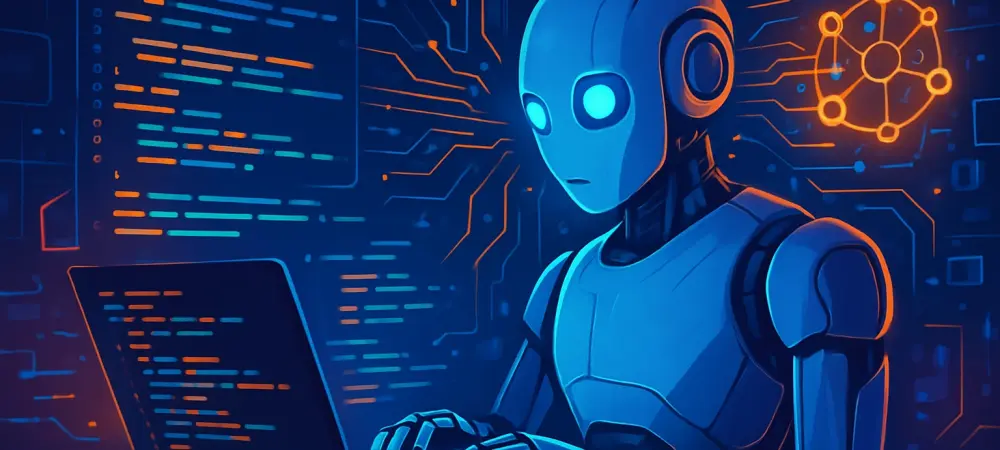What if a single line of input could churn out hundreds of lines of flawless code in mere seconds, transforming the way developers work in today’s fast-paced tech landscape? This scenario is no longer a distant dream but a daily reality for developers across the globe, thanks to the rise of Artificial Intelligence (AI). AI has surged to the forefront of software development, slashing project timelines and redefining productivity. With adoption rates soaring to 90% among developers, as reported by recent industry surveys, the impact of AI is undeniable. This transformation raises critical questions about speed, quality, and the future of coding itself, setting the stage for an in-depth exploration of how this technology is reshaping an entire industry.
The Stakes Are Higher Than Ever
The integration of AI into software engineering has become a defining trend, with businesses under immense pressure to deliver products at unprecedented speeds. AI coding tools are no longer just novelties; they are essential components of daily workflows, handling tasks from basic code generation to complex transformations. A comprehensive survey of 5,000 developers reveals that these tools are pivotal in meeting tight deadlines, yet they also introduce a delicate balance between rapid delivery and maintaining high standards of quality.
This shift significantly affects not only project timelines but also developer well-being. The constant push for faster outputs can lead to workplace friction and burnout if not managed carefully. As organizations strive to stay competitive, understanding AI’s role in enhancing software delivery performance while safeguarding team dynamics is paramount for sustained success in this rapidly evolving field.
AI’s Game-Changing Impact on Coding
AI is redefining software development through several transformative avenues. Adoption has reached a staggering 90% among developers, with over 80% reporting noticeable productivity gains and 59% observing improved code quality. These statistics highlight a clear trend: AI is becoming indispensable in optimizing workflows and reducing manual effort in repetitive tasks.
Beyond productivity, delivery speed has seen a marked improvement compared to earlier hiccups. Where AI once slowed throughput, it now accelerates it by automating mundane coding chores, allowing developers to focus on critical deployment phases. However, challenges persist, particularly with stability, as AI-generated code often prioritizes speed over reliability, leading to potential quality concerns that teams must address.
Trust in AI tools is also evolving, with confidence levels dipping to 70% from higher figures in prior assessments. This recalibration reflects a growing, healthy skepticism about AI’s inconsistencies, pushing teams to implement stricter validation processes. The data underscores a technology brimming with potential but still in need of refinement to fully align with industry expectations.
Voices from the Trenches
Insights from industry leaders paint a vivid picture of AI’s real-world impact on software development. Nathen Harvey, a prominent developer advocate, emphasizes, “AI liberates developers from tedious tasks, though stability hiccups are part of the early adoption journey as speed takes precedence.” This perspective captures the dual nature of AI as both a boon and a work in progress.
Analyst Torsten Volk offers a balanced view, stating, “Developers are often caught between awe at AI’s capabilities and irritation over its lack of contextual depth.” Meanwhile, Matthew Flug, an industry expert, cautions, “Without robust workflows, AI will magnify every organizational weakness.” These expert opinions resonate with stories of teams grappling with erratic AI outputs, while others celebrate streamlined delivery cycles, highlighting the varied experiences within the field.
Such feedback, combined with survey results showing shifting trust dynamics, reveals the complex reality of AI adoption. For every success story of a team slashing development time, there exists a counterpoint of another struggling with buggy code. These contrasting narratives emphasize that AI’s value hinges on how thoughtfully it is integrated into existing systems.
Strategies to Leverage AI Effectively
Navigating AI’s potential and pitfalls requires actionable approaches tailored to today’s development challenges. One key strategy is establishing a clear stance on AI usage, ensuring that teams understand the purpose and scope of these tools. This clarity helps align efforts and sets realistic expectations for outcomes across projects.
Another critical step involves fostering a robust data ecosystem, where high-quality, accessible internal data fuels AI tools effectively. Coupled with strong version control systems, this minimizes errors in AI-generated code. Working in small batches also proves beneficial, allowing teams to detect issues early, while a user-centric focus ensures outputs meet actual needs rather than just technical benchmarks.
For organizations aiming to boost product performance, prioritizing accessible data and a well-defined AI strategy is essential. Building a reliable internal platform further supports seamless integration. These seven best practices provide a roadmap to harness AI’s benefits, mitigating risks like stability issues and ensuring that technology serves as a true ally in development endeavors.
Looking Back and Moving Forward
Reflecting on the journey of AI in software development, it became evident that its adoption reshaped the industry with remarkable speed. The leap to near-universal usage among developers marked a turning point, bringing productivity gains and faster delivery cycles, even as stability challenges lingered. Expert insights and real-world experiences underscored that success depended heavily on structured integration and organizational readiness.
Looking ahead, teams must focus on refining validation processes to address quality concerns in AI outputs. Investing in training and robust workflows will be crucial to balance speed with reliability. As the technology continues to evolve, a commitment to fostering trust through transparency and continuous improvement will pave the way for sustainable progress in the coding landscape.

